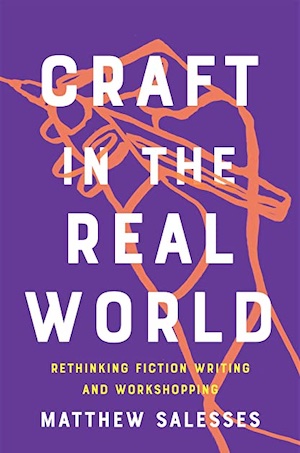By David Madden
As a novelist, teacher of creative writing for almost 60 years, and author of a book on revising fiction three decades ago, I have chosen quite naturally to review books on writing in these pages: Jane Alison’s Meander, Spiral, Explode (2019), Nicholas Delbanco’s Why Writing Matters (2020), and Matthew Salesses’ Craft in the Real World (2021). They are distinctively different from each other, as well as from my own book. They have in common the goal of rethinking the craft of fiction and the way it is taught in numerous university creative writing workshops.
These books are examples of my conviction that a reviewer may recommend a book without agreeing with much of what the author says. One has basically to see the value to other readers of engaging their agreements and disputes with the author’s perspectives.
It is Salesses’ challenging conviction that the craft of fiction as taught in most workshops fails to derive power from “the real world” and thus truly depict it. That phrase, one must suppose, implies that it is an unreal world that prevails.
Salesses asserts that “pure craft” is a lie, expecting, one may safely assume, that Flaubert, perhaps Henry James, and certain new critics turn over in their graves.
He declares that “there are many crafts.” He offers 25 answers to the question, “What is craft?” “Knowing your audience is craft.” To “own” your writing “is craft.” “Race is a matter of craft.”
“Audience, theme, and purpose” are his next considerations. Then he sets out to redefine what he calls “craft terms,” many of which are usually considered “elements” of fiction and reader experiences rather than craft. Even so, the intellectual tension between Salesses’ of use of familiar terms in fresh contexts and those teachers and students of creative writing who hold on to more traditional definitions makes this book especially worthwhile.
Similarly, his chapter offering “An Example from East Asian and Asian American Literature” is challenging to those who normally see little differences between Asian and Caucasian use of craft. Author of 7 works of fiction and nonfiction, Matthew Salesses, who is Korean, makes his case for a more sensitive awareness of differences between white male European concepts of craft and workshop policies and practices and “Workshop in the Real World” of “marginalized” young writers of color.
He concludes with “practical advice” in an appendix of “purpose oriented writing and revision exercises,” which, surprisingly would not, one suspects, seem unfamiliar in kind from those that have provided the bedrock of workshops over the past 80 years.
The inherent result of rebellion is the replacement of one set of dogmas with another set. Which is yet another example of dogma.
Author Matthew Salesses was inducted into Phi Beta Kappa at University of North Carolina at Chapel Hill.
David Madden (ΦBK, University of Tennessee) is the author of The Voice of James M. Cain: An Innovative Biography (2020), and 11 novels, 4 collections of stories, many poems, plays, literary studies. It All Came together in Paris is a novel in progress.




